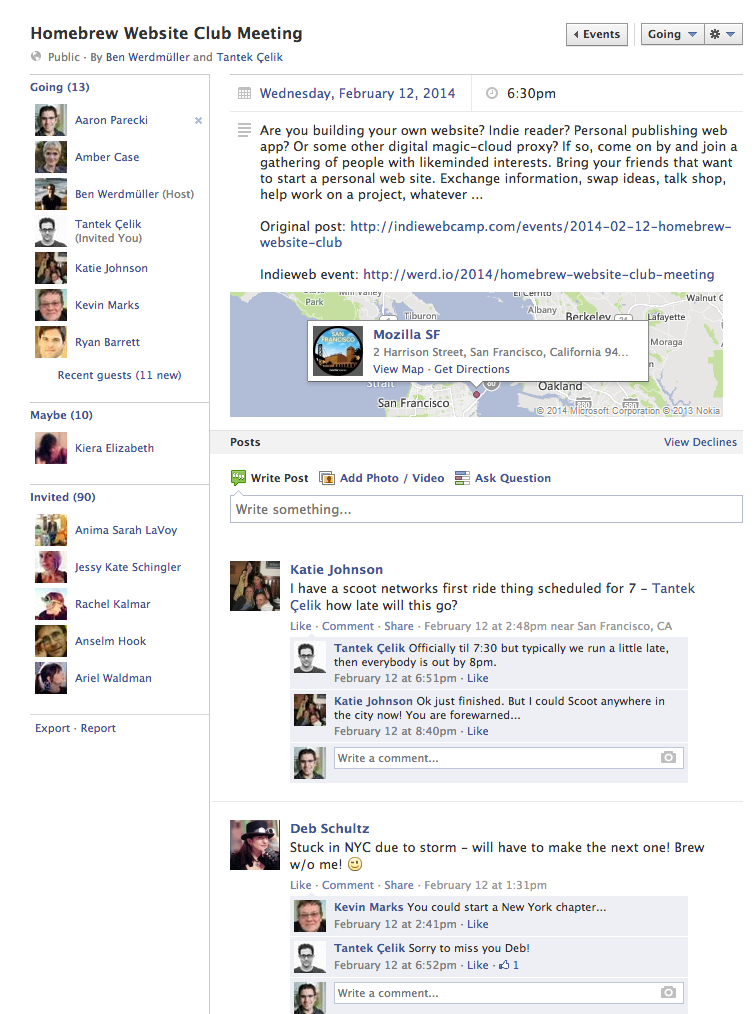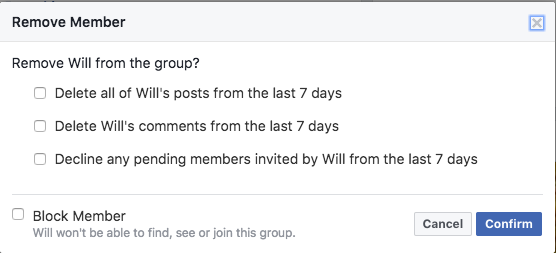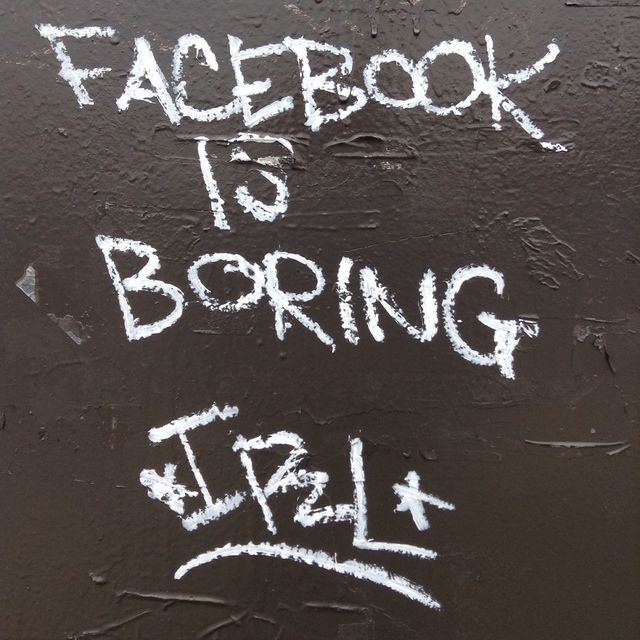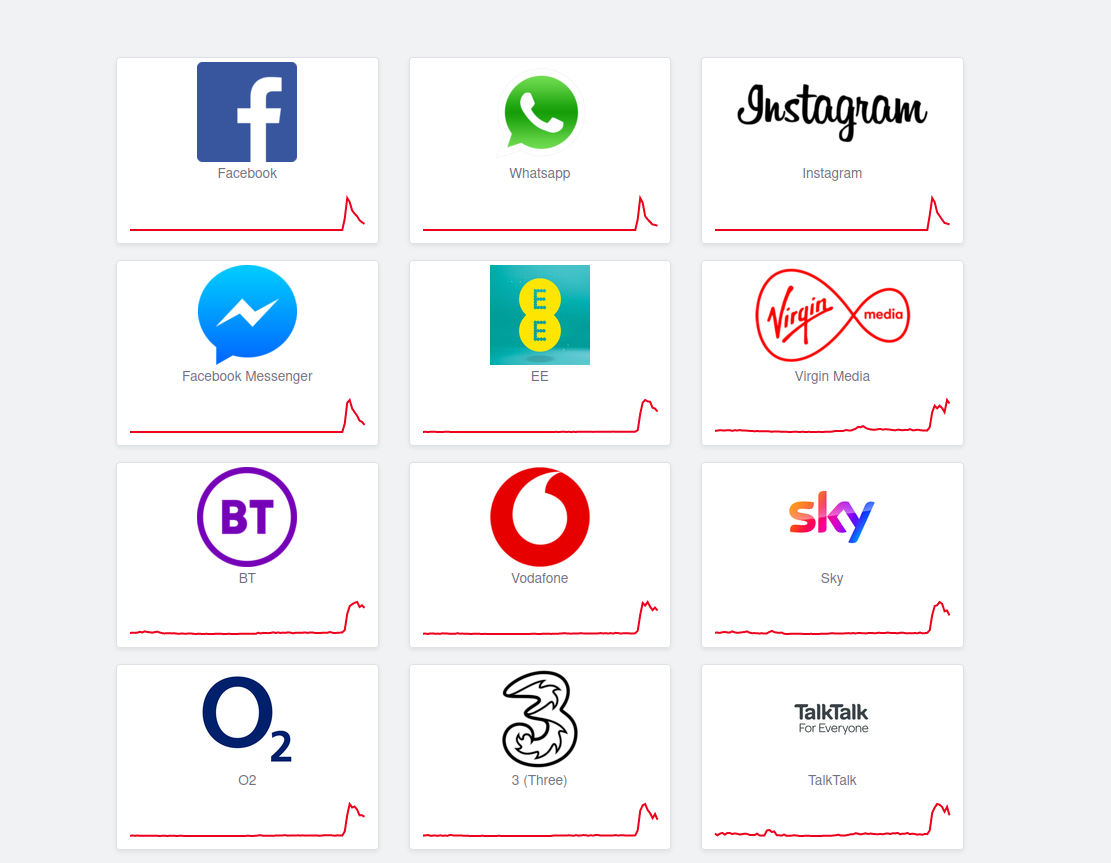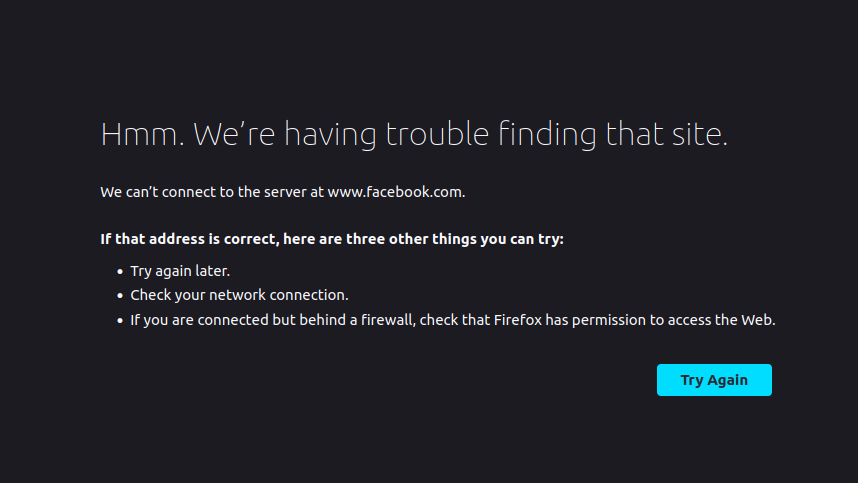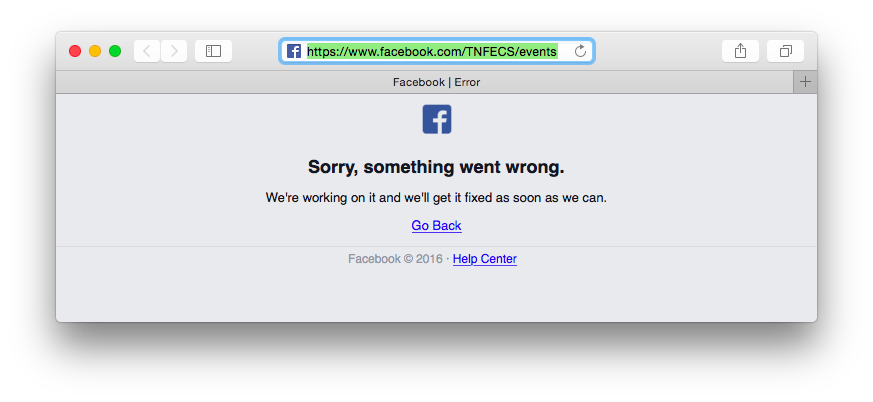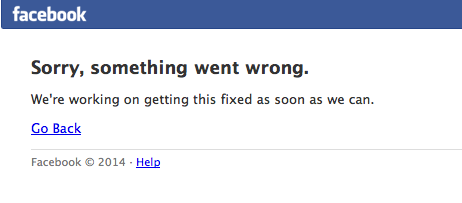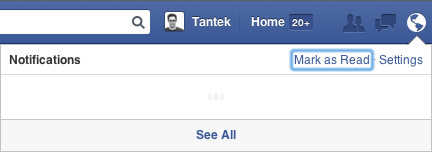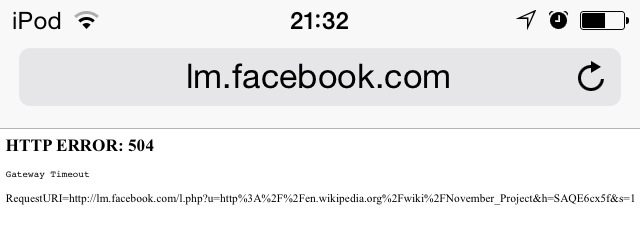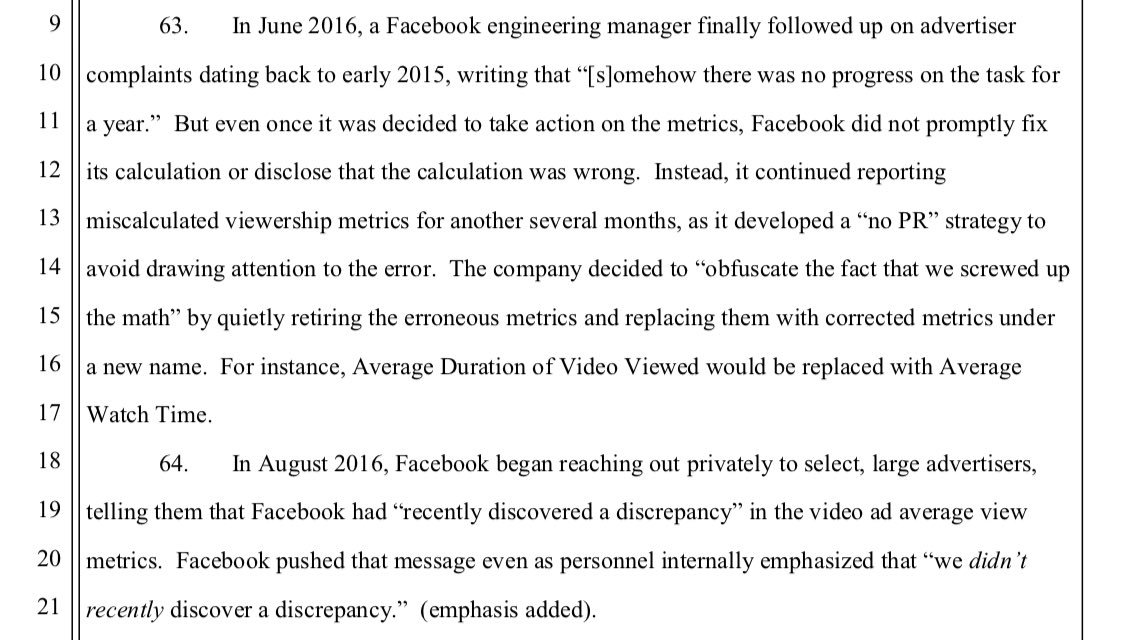
Facebook is a popular content hosting silo and activity aggregator most well known for being the largest centralized social network on the web, the primary service of Meta Platforms.
Why
Despite IndieWeb community members largely moving off of Facebook, closing their accounts, or otherwise reducing their usage, there are still a handful of reasons why a few of us keep a Facebook account. If you still use Facebook for any of these reasons, feel free to add yourself to the ones that apply to you (or add a new reason).
- Facebook Messenger:
 Tantek Çelik (because it’s more secure / reliable / device-independent than SMS)
Tantek Çelik (because it’s more secure / reliable / device-independent than SMS) - Facebook Marketplace:
 Anthony Ciccarello
Anthony Ciccarello
How to
How to export your data
Update: For the most current steps and techniques for exporting all your content from Facebook and importing to your own site, see:
- https://aaronparecki.com/2020/06/14/14/how-to-leave-facebook
- https://cleverdevil.io/2018/freeing-myself-from-facebook
Or check out the individual steps:
You can export your data on Facebook by:
- Go to: https://www.facebook.com/settings
- Click the "Download a copy" link at the bottom of the text
- See the table on https://www.facebook.com/help/405183566203254 for what data is included in the downloaded data
To export all photos in an album owned by others (such as all photos in which you are tagged):
To export Facebook messages:
- http://www.jwz.org/blog/2014/01/psa-back-up-your-shit/. This is complicated to set up and has some limitations.
- Facebook Message Scraper
Previously, Freedom.io could be used to copy Facebook posts. It is no longer maintained or recommended, but is available as an open source project.
Textile provides a service for massaging one's Facebook exported photos to put them back into galleries.
How to leave Facebook
If you'd like to move or migrate off of Facebook entirely, see  Aaron Parecki's post:
Aaron Parecki's post:
You may also consider trying out  Jonathan LaCour's experimental ditchbook project, an open source toolkit for migrating Facebook export data to any Micropub compatible website. ditchbook has been used to migrate a few people's Facebook content to their websites.
Jonathan LaCour's experimental ditchbook project, an open source toolkit for migrating Facebook export data to any Micropub compatible website. ditchbook has been used to migrate a few people's Facebook content to their websites.
How to wean yourself from
If you’re looking to reduce your usage of Facebook, you may find that incrementally doing so (as opposed to doing a cold-turkey silo-quit) may be easier.
Here are some steps to take.
- Delete the Facebook native app. Use https://m.facebook.com/ instead, or https://mbasic.facebook.com/ for a no-JavaScript experience, including access to discussions in Facebook Messenger.
- Use https://facebook.com/events/calendar instead of facebook.com
- Goal: stop checking Facebook's News Feed (for all the reasons given in #Criticism).
- IndieWeb folks doing this:
 Tantek Çelik
Tantek Çelik - Previously: fb.com/events - which now distracts you with "suggested events" at the top. /events/calendar shows you events you've RSVPd to or been invited to, and birthdays. More focused than /events
- IndieWeb folks doing this:
- Still allows:
- going to events organized on FB (seeing invitations, responding etc.)
- seeing current birthdays (today, yesterday, tomorrow)
- checking Friending activity (toolbar person outline icon)
- checking Message activity (toolbar talk bubble icon)
- checking Notifications (toolbar globe icon)
- Goal: stop checking Facebook's News Feed (for all the reasons given in #Criticism).
- Use https://m.facebook.com/events/calendar on weekend only, only on mobile
- Goal: quickly check what events are coming up just for weekends (mobile web is faster to load / view than fb.com/events)
- Goal: be even less distracted by all the other UI elements
- Specifically avoid:
- checking Notifications (toolbar alarm icon)
- IndieWeb folks doing this:
 Tantek Çelik
Tantek Çelik
- Use your profile URL https://facebook.com/me instead
- Goal: be even less compelled to be distracted than even just checking events
- IndieWeb folks doing/trying this:
 Tantek Çelik (since 2018-01-22 for ~3 days)
Tantek Çelik (since 2018-01-22 for ~3 days)
- IndieWeb folks doing/trying this:
- Still allows:
- check your POSSE copies on FB
- checking Message activity (toolbar talk bubble icon)
- Specifically avoid:
- checking Notifications (toolbar globe icon)
- Optionally
- minimize Friending activity (toolbar person outline icon), perhaps check/add only once a day/week?
- Goal: be even less compelled to be distracted than even just checking events
- Take a week+ "off the grid" vacation during which you're unable to check Facebook notifications
- Goal: stop checking Facebook notifications (toolbar globe icon)
- IndieWeb folks who have done this:
 Tantek Çelik 2016-08-07 for ~1 week, 2017-08-01 for ~1.5 weeks, 2018-01-14 for 2+ years, by being off Facebook the website completely for a week, still using FB Messenger app for comms, and then procrastinating checking notifications since. Checked notifications again ~2020-03-15 around once a day to once a week, reduced/turned off most notification sources, stopped again in April 2020.
Tantek Çelik 2016-08-07 for ~1 week, 2017-08-01 for ~1.5 weeks, 2018-01-14 for 2+ years, by being off Facebook the website completely for a week, still using FB Messenger app for comms, and then procrastinating checking notifications since. Checked notifications again ~2020-03-15 around once a day to once a week, reduced/turned off most notification sources, stopped again in April 2020. Peter Molnar when he visited China (no Facebook there)
Peter Molnar when he visited China (no Facebook there)
- IndieWeb folks who have done this:
- Goal: stop checking Facebook notifications (toolbar globe icon)
Weaning Brainstorming
More thoughts on how one could reduce one's Facebook usage
- document all your Facebook use-cases as itches to implement on your own site
- pick the easiest use-case to implement yourself, build it, and try stopping using Facebook for that
- ...
How to POSSE to
There are multiple ways to POSSE out some things from your indieweb site to your Facebook profile. Specifically, you can POSSE posts and event RSVPs, but as of the 2.x Facebook API, not comments or likes. Comments and likes can't be PESOSed either.
Existing techniques:
from Twitter
- Tantek POSSEs notes, articles by name + permalink, replies (including RSVPs) out from tantek.com to Twitter, and then uses the Twitter/FB integration functionality to cascade (except for plain replies) that POSSEing from Twitter to Facebook. Reasons:
- insufficient marginal utility in writing a custom POSSE syndicator to FB.
- FB just gets abbreviated summaries (thus placing more value on tantek.com original posts).
- Exception: In 2014 Tantek started occasionally manually using Bridgy Publish to POSSE a few longer and more significant posts (notes and articles) directly from tantek.com to Facebook.
- Working on adding to Falcon: Automatic Bridgy POSSE to FB
- tommorris does likewise, because he's lazy.
IFTTT
- Adactio POSSEs notes, photos, articles out from adactio.com to Facebook using If This Then That (IFTTT).
Bridgy
Bridgy used to support POSSEing posts, event RSVPs, comments and likes, but Facebook eventually disabled that in their API.
Facebook API
Posting to one's wall used to be supported with the Facebook 'Graph API' - see POSSE to Facebook for details and examples - but they'll disable that in August 2018.
For broader overview of the Facebook API, see the Social Web WG analysis:
How to PESOS from
You can use the Facebook API to PESOS your posts, but as of the 2.x API, not your comments or likes.
How to backfeed from
There used to be a few programmatic ways to backfeed from Facebook post copies to your original posts, but Facebook pretty much shut them all down in May 2018.
Graph API
The Graph API is the official way of communicating with Facebook.
To get comments for a post, only from users who have logged into your Facebook app and granted its permissions, use /object/comments:
https://graph.facebook.com/v2.2/POSTID/comments?limit=LIMIT&access_token=ACCESS_TOKEN
POSTID is the id of a post; no need for any user id, just the regular, post id LIMIT how many comments should be shown in one request ACCESS_TOKEN is the Oauth2 access token to the service
Similarly, to get likes for a post, only from users who have logged into your Facebook app and granted its permissions, , use /object/likes:
https://graph.facebook.com/v2.2/POSTID/likes?limit=LIMIT&access_token=ACCESS_TOKEN
Note recent limitations / challenges:
- 2018-04-04 Facebook Developer Blog: API and Other Platform Product Changes
For event post backfeed in particular:
Related Bridgy issue: https://github.com/snarfed/bridgy/issues/814Events API
Deprecated:
Endpoints that return data including /feed, /posts, /comments, and the RSVP list.
FQL
- before Graph API 2.2, there was FQL that could be used as:
- FQL makes this surprisingly easy. For example, here's a query to get all comments on the posts from a given user with links in them:
SELECT post_fbid, time, fromid, username, object_id, text FROM comment WHERE object_id IN (SELECT link_id FROM link WHERE owner = USER_ID) ORDER BY time DESC
- And here's the follow-up query to get the URLs of those links (where LINK_IDS is a comma-separated list of the object_ids from the above query):
SELECT link_id, url FROM link WHERE link_id IN (LINK_IDS)
- See example code here. There's also this example code that fetches and processes comments from the posts found by those queries.
- API is sometimes slow. Most backfeed solutions will/should poll in offline processes though, so they won't usually block end user requests.
- Returns extremely unclear failed results for API calls to posts by under-18s
- This is bloody annoying for us minors. It's more "bothersome" than "protecting" -- barnabywalters
- How best to represent external users?
- Facebook URI (not preferable)
- Can we grab their personal URI from their profile?
- Detect comments from originating user?
Bridgy backfeed
Bridgy used to backfeed Facebook comments, likes, reactions, and RSVPs, but stopped in May 2018 due to Facebook's restrictions.
How to delete your account
Deletion of an account is made deliberately awkward and uncomfortable by Facebook. Note that there are two separate types of account deletion, viz. Deactivation and Deletion.
Deactivation of an Account
Deactivation of an Account can be achieved using the normal Facebook menus.
The system in January 2018 was as follows:
- Click the account menu at the top right of any Facebook page
- Select Settings
- Choose Manage your account and then scroll down to click Deactivate your account.
- You are asked to choose the reason for deactivation, such as 'It's not fun' or 'I don't feel safe' - Facebook will provide 'solutions' to the issue you choose such as 'make more friends'
- You are also presented with a selection of your friends with prompts that 'xxxx will miss you' in an attempt to emotionally manipulate you into staying.
Surprisingly, deactivation is not hidden away under layers of menus; it is in plain sight being in the description of the Manage your account section of settings.
Note that Deactivating your account just means that your profile becomes 'hidden' to other Facebook users. Your posts, photos, tags, comments are all still present on Facebook, as is all data Facebook hold about you, whether that was provided by you in profile settings or otherwise. Messages you have sent to other users will still be visible to them. If you change your mind, simply logging back into Facebook restores all data to a user-accessible state.
Deletion of an Account
Deletion of an Account cannot be accomplished using the Facebook menus.
- Go to the page https://www.facebook.com/help/delete_account which is linked from various help articles
- Complete your password
- You are then informed that:
Your account has been deactivated from the site and will be permanently deleted within 14 days. If you log into your account within the next 14 days, you will have the option to cancel your request.
Deleting your account removes all photos, tags, comments and all user-provided data from Facebook. It does not delete non-user-provided data, such as your identity in 'tags' from other users photographs, your telephone number and email address if provided by another user (e.g. by accessing Contacts on a smartphone)
See also: delete your account
Features
(this section is a stub, when it has been more well filled-in, move to top of page after dfn, similar to Twitter page)
User features on Facebook's site:
- create/read/update(with versioning)/delete posts of various types, expanded more below
- status (note)
- photo/video
- life event
- safety status
- previously: bookmark (2014 and earlier?)
- hidden in a mode or context: event, RSVP
- Year in Review
- ...
- responses to posts including
- on this day
- add friend
- follow
- see friendship
- block
- legacy contact
- all activity - appears to only work for some users (might be going away!), go to https://facebook.com/me/all_activity
- See 2015-04-25 aaronpk screenshots
- profile page (equivalent of indieweb homepage) configuration including
- header image
- icon
- temporary profile picture
- profile video [1]
- name
- wall (now called "Timeline")
- recent activity summary with
- Visited (city / state / country) - datetime ago
- At (name of current event attending), or Going to (next event attending)
- Became friends with (person and n other people)
- n mutual friends including person1 and person 2
- friends box (3x(1-3) grid of thumbnails with names in lower left of each in white)
- recent photos box (3x(1-3) grid of thumbnails)
- recent videos box (3x(1-3) grid of thumbnails)
- recent checkins box (list of 1-4 items with thumbnail, linked name of venue, grey text of datetime since)
- recent music box (3x(1-2) grid of artists with thumbnails and names as caption below each)
- recent TV shows box
- recent liked pages (3x(1-2) grid of page thumbnails and names as caption below each)
- recent groups box (list of 1-4 items with thumbnail, linked name of group, grey text # of members, description one line elided)
- recent reviews box
- recent notes box (not sure how these are/were different from status updates)
- recent Instagrams (if someone has connected their account in some direction?)
- recent Foursquares (if someone has connected their account in some direction?)
- about section with many features inside its various tabs:
- favorite quotes
- ...
- notifications
- safety check
- Facebook Page - a way to create profiles that have a number of administrators that can act as that profile
- ... lots of other features
- ...
Facebook has a number of interesting post types, each with different appearances and interfaces. Some better than others.
User features Facebook handles on other sites:
- embeddable like, share etc. buttons (webaction)
- Facebook Comments Plugin
Status Update
Status updates are notes similar to Twitter tweets, that, including status updates with links (see below) are perhaps the most common type of top-level post on FB.
2011 limitation and Note distinction:
- 419 character limit as of 2011-02-16. When you try to post 420 or more characters, you get an alert:
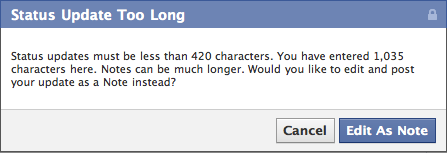
Status updates must be less than 420 characters. You have entered 1,035
characters here. Notes can be much longer. Would you like to edit and post
your update as a Note instead?
via http://tantek.com/2011/047/b1/facebook-installed-application-activities-not-deletes
Link
Links posts are essentially status updates, but they have a different presentation due to the link-preview that is shown for the first link mentioned in the update.
Photo
Photo posts are perhaps the second most popular type of top-level post on FB.
Event
Facebook's event posts were quite clean and nicely designed, until they started rolling out a new design on 2014-02-27. Here is the design just before that point:
Sometime in 2015(?specific date), Facebook launched a new event UI which includes:
- a related events box in the right column, just underneath the "Invite Friends" box below the attendees box showing interested, going, invited numbers, as well as a few friends who have RSVPd at least interested/maybe or yes.
Comment
Comments are perhaps the overall most popular type of post, as people comment A LOT on other top-level posts, and Facebook has a two level notion of comment threading. That is, you can both comment on top-level posts, and comment on comments on top-level posts. The above event post screenshot demonstrates this two level commenting interface.
Aggregator
Facebook performs the function of a feed aggregator of all your friends' activities.
Some examples screenshots can be found here:
Analysis of some of the algorithms Facebook uses to choose what to display to users:
Comments Embed
Facebook has a feature called Comments Box which "is a social plugin that enables user commenting on your site." Indieweb sites can use it to embed a comments box on blog posts.
Though this does encourage your readers to sharecrop (on Facebook) their comments on your posts, it also provides them a single place to view their comments they've made across any/all sites that use Facebook for comments.
No indieweb community members are currently using this on their own sites.
IndieWeb community members that have tried this and their experience:
- Aaron Parecki:
Groups
Facebook groups have a variety of privacy settings.
Removing someone from a group prompts to delete their posts or comments from the last 7 days.
If you are the last member of the group and you leave the group, a confirmation is displayed saying that the group will be deleted.
Anti-patterns
Some things that Facebook implements are actually anti-patterns and to be avoided:
- nagging (example inside)
Subsidiaries
Facebook owns the following companies / products / services:
- Oculus
- Quest 2 is the current version of the VR headset by Facebook/Oculus. See https://www.oculus.com/quest-2/.
Activities Examples
- Alice shared Bob's status update.
- Alice shared Bob's photo.
- Alice likes Some Page.
- Alice likes a photo.
- Alice and 8 other friends wrote on Bob's timeline for his birthday.
- Alice added 3 new photos to the album Some Album.
- Alice updated her cover photo.
- Alice changed her profile picture.
- Alice commented on a link.
- Alice shared a link.
- Alice was tagged in Bob's photo.
- Alice played 10 sounds on SoundCloud.
- Alice added a job at Some Company to her timeline.
- Alice likes a photo on Instagram.
- Alice shared a story via Some Page.
- Alice made your photo her profile picture

- Alice just posted for the first time in a while.

rel-me
Facebook does not currently support rel-me on their user profiles.
However, they do have a "website" field in the UI which you can set.
And then applications that wish to use that field for a one-off rel-me equivalence test can access that through their API:
Careful parsing it, people often put multiple whitespace- or newline-separated urls.
Criticism
Summary on nearly all of the issues of Facebook: Get your loved ones off Facebook.
New York Times 15th Anniversary video
Collects App Data Usage from other Android Apps
Here’s the bad news: seven apps, including Yelp, the language-learning app Duolingo and the job search app Indeed, as well as the King James Bible app and two Muslim prayer apps, Qibla Connect and Muslim Pro, still send your personal data to Facebook before you can decide whether you want to consent or not. Keep in mind: these are apps with millions of installs.Privacy International
Does Little to Limit Attacks on Female Politicians
In the 2018 Congressional and state elections in the United States female candidates faced increased online threats on Facebook that ranged from sexist attacks to death threats [4]
Under the current policy, there is no recourse for harassment via an anonymous Facebook page until a threat is made. Waiting for harassment to escalate isn’t a tool designed to protect women. It’s endorsing a culture in which violence against women is the norm.State Rep. Jillian Gilchrest, D-West Hartford, Connecticut, USA
Paying Teenagers for Root Access to Cell Phones
Facebook, after having their apps banned by Apple Store decided to pay teenagers $20 a month for root access to their cell phones in order to spy on competitors
Facebook has been secretly paying people to install a “Facebook Research” VPN that lets the company suck in all of a user’s phone and web activity, similar to Facebook’s Onavo Protect app that Apple banned in June and that was removed in August. Facebook sidesteps the App Store and rewards teenagers and adults to download the Research app and give it root access to network traffic in what may be a violation of Apple policy so the social network can decrypt and analyze their phone activity.Facebook pays Teens to Install VPN that Spies On Them
It was later revelead that 18% of participants in the program were teens and not the 5% that facebook originally claimed.
At the time we ended the Facebook Research App on Apple’s iOS platform, less than 5 percent of the people sharing data with us through this program were teens. Analysis shows that number is about 18 percent when you look at the complete lifetime of the program, and also add people who had become inactive and uninstalled the app.Facebook admits 18% of Research spyware users were teens, not <5%
Preying on Children
Even after complaints from employees that the in app purchases may confuse children facebook refused to provide refunds to parents resulting in lawsuits. Internal documents reveal that facebook referred to children who accidently charged parent credit cards heavily as "whales," a term used by casinos and con artists to note easy lucrative and naive targets.
In one of the unsealed documents, two Facebook employees deny a refund request from a child whom they refer to as a “whale” – a term coined by the casino industry to describe profligate spenders. The child had entered a credit card number to play a game, and in about two weeks racked up thousands of dollars in charges, according to an excerpt of messages between two employees at the social media giant.Center for Investigative Reporting
Algorithmic Filtering
Facebook uses a proprietary algorithm to show you a fraction (what they think you want to see) of the posts from your friends, and people & pages you follow. Up to 85% less than "all".[5]
This has been criticized many times.
- 2016-01-28 Gerd Leonhard: The evilfication of Facebook: boiling frogs, faustian bargains, and the pleasure trap: 10 arguments for quitting Facebook
- 2015-05-07 Zeynep Tufekci: How Facebook’s Algorithm Suppresses Content Diversity (Modestly) and How the Newsfeed Rules Your Clicks
- 2015-05-07 Eli Pariser/Gizmodo: A New Study From Facebook Reveals Just How Much It Filters What You See
- 2015-01-28 Sheldon comic: Facebook is a doughnut-stealing mobster
- 2012-11-13 Caitlin Dewey/Washington Post: Facebook ‘all’ link reveals feed without filters
- 2012-11-12 Josh Constine/TechCrunch: This Facebook “All” Link Let You See An Almost Unfiltered News Feed, Until Facebook Shut It Down
Attacks and spoiling campaigns to discredit critics
- In November 2018 a NYT research revealed the tactics behind Facebook’s crisis management. Following their Cambridge Analytica data scandal they hired several republican PR agencies like "Definers" to discredit critics.
TechCrunch published a memo by FB manager Elliot Schrage wich was "officially published" 2 days later in the night before Thanksgiving [6]. While Schrage took blame for hiring "Definers" shortly afterwards dpa (german press agency) tickered that several agencies were hired too. (deu) [7]
These PR agencies produced Fake News and antisemitic conspiracy theories to attack George Soros [8] because he characterized Facebook and Google as a “menace to society” at the World Economic Forum in Davos in January 2018.
It seems to be irrelevant for Facebook that Soros supported the company financially before, for example by paying their german factcheckers (deu) [9] …]
API Degradation
Version 2.0[10] of the Facebook API mostly makes sensible changes to help tamp down spammy or privacy-violating apps (e.g. prevents you from seeing a user's friends unless the friends have also granted privileges to the app). But this change has broken some features that IndieWeb sites and Bridgy Publish depend on. Full discussion on IRC
- Apps are given app-scoped user IDs now (i.e. they are unique to the application, as opposed to the global user IDs v1.0 used)
- However, given a user's username, you can apparently no longer find their user ID.
- Which means that you cannot get the post ID for a post from its URL.
- For some posts you can look them up by /v2.2/{post-id} but most posts expect /v2.2/{user-id}_{post-id}, and there doesn't seem to be any predictable way to tell if a post wants the former id or the latter.
API Inconsistency
The ID for a number of comments has changed over time, resulting in Bridgy sending apparently duplicate mentions to the same post. The symptom is that the same comment will be received with an ID of the form USERID_POSTID, and later the same comment will have an ID with a different form, containing colons and apparently magic numbers.[11]
On 2015-04-07, Facebook support let us know that this "IDs like these can appear sometimes", and that it will not be fixed.
Hand-approval required to post via API
Unless the application developer is the only user, Facebook now requires applications to be hand-approved by the Facebook team if they are to post to a user's stream. This requires an application logo, complete screenshot walkthrough, and full privacy policy.
Big data collection allows intrusive inference
Facebook's big data collection allows intrusive inference about you
- 2016-01-28 Gerd Leonhard: The evilfication of Facebook: boiling frogs, faustian bargains, and the pleasure trap: 10 arguments for quitting Facebook
- A 2013 study found that accurate predictions can be made about the personality, political preferences and even sexual orientations of Facebook users based only on which Facebook pages a user "likes", even if a user hasn't explicitly revealed that information on their profile. (Huffington Post writeup)
- A 2009 study at MIT found that social network analysis of Facebook friend relationships could also reveal a user's sexuality. (Mashable)
- The inference is often so accurate that many people are convinced that Facebook is listening to their phone's microphone. Reply-All's podcast episode 109, published 2-11-2017, Is Facebook Spying on You?, demonstrates the futility of trying to persuade people that it is not spying, just data-gathering and manipulation that makes Facebook so creepy. Also supports the old journalistic epigram about the correct response to a headline that is a question. Of course, Facebook could also be spying.
Real Name demands
While not as bad as Google+, Facebook have been attempting to enforce the "real name" policy. In 2014-09, it was revealed Facebook had disabled the accounts of a number of drag queens requiring them to use their legal names. [12]
2014-09-17: Accounts which don't seem like they have "normal" names have also been challenged by Facebook's policy. [13]
2015-06-26: Facebook disabled a user's account because of their name, the same name they used to work for and get paid by Facebook as an employee:
Image used in link preview
On 2014-09-29, when I pasted a link to a blog post in a Facebook status, the link preview used one of the comment's avatars instead of the og:image meta element I have had in my HTML for years. I had to manually click through the images until the correct logo appeared. I am not sure if this is a glitch or if Facebook has changed their algorithm.
After using Facebook's Open Graph Object Debugger, I found it reported:
og:image was not defined, could not be downloaded or was not big enough. Please define a chosen image using the og:image metatag, and use an image that's at least 200x200px and is accessible from Facebook.
The image I'm using currently is only ~120px square. I guess that explains it, but it seems silly for Facebook to ignore the explicit og:image element I have set up. —  gRegor Morrill
gRegor Morrill
Duplicate Events Created without Confirmation
On 2014-10-20 I ( Kara Mahan) tried to create a new HWC event using the "Copy Event" UI. I filled in the appropriate fields and clicked "Create". The button greyed out momentarily, and then re-enabled without any confirmation that the event had been copied. I checked my activity feed to see if it was there, and it was not, so I proceeded to click Create two more times before it seemed to go through. Some time later, 3 identical FB events all appeared (maybe an eventual consistency issue?).
Doesn't delete deleted data
Facebook does not really delete data when a user clicks on 'delete', but it flags the post as 'deleted', keeping all the data in it's database.
Encourages Bad Online Publishing Behaviors
 Perhaps cliché and thus source for humor but with elements of truth. Unclear if these bad behaviors are due to Facebook's UI/UX (especially Newsfeed / like / share feedback loop), or just that Facebook is surfacing existing behaviors across a very broad spectrum of people. The humor in the cartoon works because these behaviors are fairly known / expected by users of Facebook. Still, specific citations would help with further analysis to see if the indieweb can do better (or is vulnerable to doing worse).
Perhaps cliché and thus source for humor but with elements of truth. Unclear if these bad behaviors are due to Facebook's UI/UX (especially Newsfeed / like / share feedback loop), or just that Facebook is surfacing existing behaviors across a very broad spectrum of people. The humor in the cartoon works because these behaviors are fairly known / expected by users of Facebook. Still, specific citations would help with further analysis to see if the indieweb can do better (or is vulnerable to doing worse).
- Posting about minor annoyances [citation needed]
- Sponsored posts [citation needed]
- Sharing of "clickbait" headlines [citation needed]
- "Here's a friend crossposting from Twitter, so all these @ tags don't work." - perhaps a good reason to NOT secondhand POSSE from Twitter to FB. [citation needed]
- Posting racist screeds that rely upon made-up quotes and statistics [citation needed]
Social experiment performed on users
- A study published June 2, 2014 revealed that one week in 2012, Facebook tweaked the feeds of about 700,000 users to see if it could manipulate their mood and posting behavior [14]
Live user frustration test
Facebook deliberately artificially crashed their Android app as a live (unbeknownst to the users) user-test to test frustration / abandonment! https://twitter.com/internetofshit/status/684124629963685888 and https://twitter.com/internetofshit/status/684125090527752194: 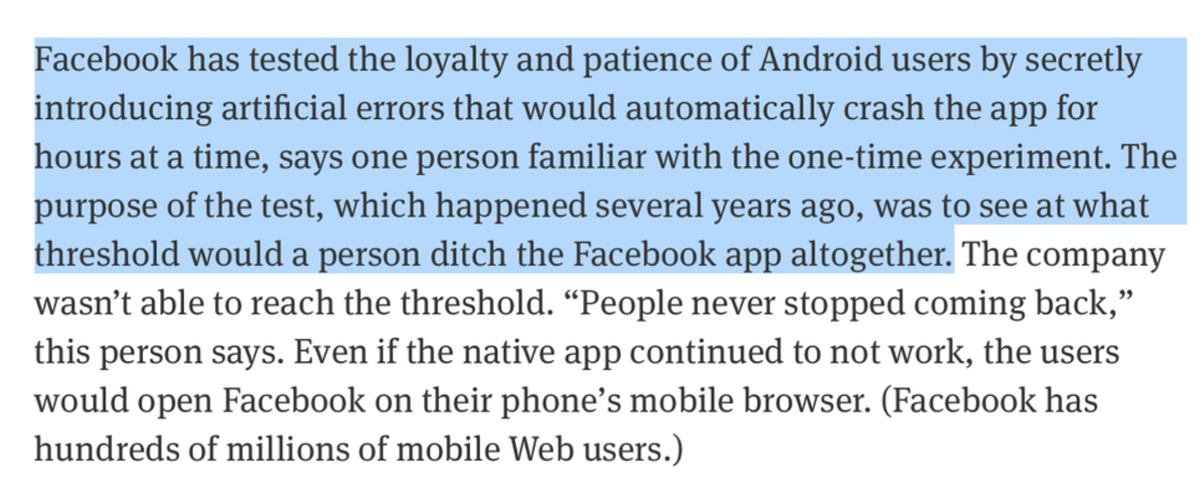
Harmful to Body Image
- 2014-04-10 LiveScience / Agata Blaszczak-Boxe: Dislike: Facebook May Hurt Women's Body Image
Facebook use causes decline in satisfaction
2013-04-17 The Economist: Facebook is bad for you: Get a life! Using the social network seems to make people more miserable
… the more someone uses Facebook, the less satisfied he is with life.
[…]
the more a volunteer used Facebook in the period between two questionnaires, the worse he reported feeling the next time he filled in a questionnaire. Volunteers were also asked to rate their satisfaction with life at the start and the end of the study. Those who used Facebook a lot were more likely to report a decline in satisfaction than those who visited the site infrequently.
But an earlier investigation, conducted by social scientists at Humboldt University and Darmstadt’s Technical University, both in Germany, may have found the root cause. These researchers, who presented their findings at a conference in Leipzig in February, surveyed 584 users of Facebook aged mostly in their 20s. They found that the most common emotion aroused by using Facebook is envy. Endlessly comparing themselves with peers who have doctored their photographs, amplified their achievements and plagiarised their bons mots can leave Facebook’s users more than a little green-eyed. Real-life encounters, by contrast, are more WYSIWYG (what you see is what you get).
Emphasis added.
Is Boring
Per grafitti in Minneapolis, 2014-234, photo by  Tantek Çelik
Tantek Çelik
"FACEBOOK IS BORING *IRL*"
Reinforcing shallow dopamine responses
- 2016-01-28 Gerd Leonhard: The evilfication of Facebook: boiling frogs, faustian bargains, and the pleasure trap: 10 arguments for quitting Facebook
I recently realised that my online behaviour is being manipulated by the fact that I enjoy being ‘liked’ on Facebook.
Pacifies isolates people with comfort bubbles
- 2016-05-10 Hossein Derakhshan: Mark Zuckerberg is a hypocrite - Facebook has destroyed the open web[15]
Emphasis added.All the videos, images, and articles we see in our newsfeeds are picked for us based on our habits, based on our previous likes and reshares, which have taught Facebook about our preferences. Naturally, most of us only like what or who we agree with, and Facebook therefore rarely upsets, challenges, or surprises us.
It is heart-breaking to see how Facebook has changed the internet into little more than a portal for entertainment
While Zuckerberg laments at walls and admires bridges, the fact is that his Facebook algorithms have created billions of these comfort bubbles that are even more isolating than walls.
Builds demographic profiles including "ethnic affinity"
Facebook does not ask you about your ethnicity, but builds demographic profiles based on what you do on the site, including an "ethnic affinity". ProPublica demonstrated and reported that ads for housing could exclude people based on this "ethnic affinity". Facebook has since announced they will disable "ethnic affinity" targeting for housing, employment, and credit-related ads.
- 2016-10-08 : Facebook Lets Advertisers Exclude Users by Race
- 2016-11-11 : Facebook will disable “ethnic affinity” targeting for housing, employment and credit-related ads
Let advertisers target users interested in Nazis
Despite promises of greater oversight following past advertising scandals, a Times review shows that Facebook has continued to allow advertisers to target hundreds of thousands of users the social media firm believes are curious about topics such as “Joseph Goebbels,” “Josef Mengele,” “Heinrich Himmler,” the neo-nazi punk band Skrewdriver and Benito Mussolini’s long-defunct National Fascist Party.
- 2019-02-21 : Facebook decided which users are interested in Nazis — and let advertisers target them directly (archived)
Downtime
Though typically rare and brief, Facebook does go down / offline from time to time, most recently:
2021-10-04
Facebook and services it owns such as Instagram, Messenger, and Whatsapp, suffered a global outage.
Initial reports stated that the outage was caused by a DNS issue, as seen by this comment posted by someone claiming to be from the "recovery team" on Reddit:
As many of you know, DNS for FB services has been affected and this is likely a symptom of the actual issue, and that's that BGP peering with Facebook peering routers has gone down, very likely due to a configuration change that went into effect shortly before the outages happened (started roughly 1540 UTC). There are people now trying to gain access to the peering routers to implement fixes, but the people with physical access is separate from the people with knowledge of how to actually authenticate to the systems and people who know what to actually do, so there is now a logistical challenge with getting all that knowledge unified. Part of this is also due to lower staffing in data centers due to pandemic measures.
This thread was documented on Hacker News.
This outage caused initial complications with many other services, as seen on the popular status reporting website downdetector.co.uk at the time of the outage:
Facebook services reportedly showed an error message initially before then returning no requests at all, as seen in the screenshot below:
The DNS issues Facebook ran into then caused issues with other services. Cloudflare's CTO commented on how they had to coordinate a response due to the retries to their 1.1.1.1 DNS service caused by Facebook's servers not returning any content:
Now, here's the fun part. @Cloudflare runs a free DNS resolver, 1.1.1.1, and lots of people use it. So Facebook etc. are down... guess what happens? People keep retrying. Software keeps retrying. We get hit by a massive flood of DNS traffic asking for http://facebook.com
Source: https://twitter.com/jgrahamc/status/1445066136547217413
2017-10-11 Outage
https://twitter.com/NesiKa11/status/918135764759613440
2017-08-26 Outage
Saturday morning turned out to be social-media-free for a number of Facebook and Instagram users, albeit involuntarily.
Some people reported difficulties accessing the two social platforms beginning at about 9 a.m. ET
from http://money.cnn.com/2017/08/26/technology/business/facebook-down/
2016-08-26 Partial Outage
- 2016-08-26 ~16:00-16:10 (at least) flakey / apparent unavailability of page events pages:
Sorry, something went wrong.
2014-08-01 Outage
2014-08-01 CNBC: Facebook goes down for many users
- 2014-08-01 ~9:00-9:40 flakey / intermittent availability with lots of "Something went wrong" messages, e.g. on a permalink page when logged in:
- on a group page when logged in:
- and on the home page:
- on a previously loaded FB page, the "Notifications" globe drop-down just rotated a progress image for minutes and never loads:
Prefers Pageviews Over Efficient UX
Per the documentation in reader#Integrated_Activity_Reading, one of Facebook's UI experiments involved an integrated reading experience that showed by posts and other "activities" in a single reading stream:

What they found was that it was too efficient - users were reading things and not clicking to see additional pages.
Thus they abandoned the experiment, instead preferring a UI that generates more pageviews over a UI that is more efficient for users.
This may present an opportunity for IndieWeb UX to exceed silo UX.
Link Wrapper Problems
Link Wrapper Unreliability
Facebook's link wrapper lm.facebook.com sometimes has outages, thus breaking all links in content in Facebook.
E.g. 2014-08-10 ~21:25-21:32 (at least)
Hyperlink Fear Interstitial

Facebook mobile app (apparently) warning the user about Twitter t.co link-wrapped links as having "a problem".
via https://twitter.com/kyle_wm/status/446818317408280576
Censorship
- 2017-06-28 : Facebook’s Secret Censorship Rules Protect White Men from Hate Speech But Not Black Children (archived)
- 2018-02-16 : Facebook is Censoring My Notes (archived)
Changed emails to @facebook.com
- 2012-06-25 : Facebook's Lame Attempt To Force Its Email Service On You (archived)
- 2012-06-25 : Facebook spokesperson response [no title] (archived)
Scraped call and SMS logs from Android phones
- 2018-03-24 : Facebook scraped call, text message data for years from Android phones (archived)
- How to see/remove the contact information you've uploaded: 2018-03-25 : Check the Contact Information You've Uploaded to Facebook (archived)
Inflated Content Viewing Statistics
- https://twitter.com/dyfl/status/1052403439613829120
- "If you missed it: today it was confirmed that Facebook massively & knowingly inflated its video-view statistics, which had the DIRECT consequence of 90% of media orgs firing writers in favor of expensive video producers, who also got fired when it turned out video was worthless" @dyfl October 17, 2018
- http://fortune.com/2018/10/17/advertisers-facebook-video-metrics/
- https://www.theverge.com/2018/10/17/17989712/facebook-inaccurate-video-metrics-inflation-lawsuit
- https://www.fastcompany.com/90252751/why-media-people-are-furious-over-facebooks-bad-video-metrics
- https://www.engadget.com/2018/10/17/facebook-accused-lying-video-stats-year-lawsuit-metrics/
LogOutFacebook
- On 2018-12-17 The NAACP, National Association for the Advancement of Colored People returned a donation from facebook and called for a national boycott (with hashtag #LogOutFacebook) given the evidence that black communities were specifically targeted for efforts of voter suppression [16]
- 2018-12-18 Vice: The NAACP wants you to boycott Facebook. Here’s why.
- 2018-12-18 MotherJones: Facebook Let Russia Target African Americans. Now the NAACP Is Calling for a Boycott.
Revelations spark demands toward “a platform that has been unwilling to do the right thing.”
- 2018-12-18 Forbes: Facebook Talks Goals, Civil Rights During NAACP Boycott Of Its Platforms
- 2018-12-18 Bloomberg: NAACP Seeks Week-Long Facebook Boycott Over Racial Targeting
Mass Bans
- 2025-06-30 Facebook Group admins complain of mass bans
Currently, Reddit’s Facebook community (r/facebook) is filled with posts from group admins and users who are angry about the recent purge. Some report that all the groups they run have been removed at once. Some are incredulous about the supposed violations — like a group for bird photos with just under a million users getting flagged for nudity.
Advocates
Robert Scoble defended using Facebook in a post, "What will you miss when you quit Facebook?"
1. Filtered feed. Truth is this is a mixed bag. For me it's a HUGE deal because I have put thousands of hours into tuning my feed and I have many of the world's top technologists on Facebook.
Someday Facebook will change something (or just disappear), and all these hours will be wasted. Imagine if he'd spent just 1/10th of that time working on his own site. —  gRegor Morrill
gRegor Morrill
Deactivation Prompts
When a user attempts to deactivate an account, a number of prompts appear, and a user is required to complete one to progress the deactivation procedure.
Mottos
Facebook has some development mottos that we can perhaps learn from.
Move Fast And Break Things
From ??? until 2014-04-30, Facebook infamously had the motto:
- Move Fast and Break Things
Even in their IPO paperwork[17]
Move Fast With Stable Infra
On 2014-04-30[18], in a public announcement, Facebook changed their motto to:
- Move Fast With Stable Infra
Articles
Articles that may provide insights on how to motivate individuals to move from Facebook to the indieweb (most recent first):
- 2021-12-29 : Facebook’s very bad year. No, really, it might be the worst yet
- 2021-10-25 : Facebook Papers: ‘History Will Not Judge Us Kindly’
Thousands of pages of internal documents offer the clearest picture yet of how Facebook endangers American democracy—and show that the company’s own employees know it.
- 2021-10-22 : ‘Carol’s Journey’: What Facebook knew about how it radicalized users
- 2021-10-07 : We're Thinking About Facebook Wrong (video)
- 2021-10-07 : When Facebook went down this week, traffic to news sites went up
- 2021-10-05 : "My God," whispered Dr. Sattler. "It's an apex content predator." Dr. Grant made a face. "Facebook." He said, grimly, translating for the audience.
- 2021-09-30 : Facebook Prioritizes ‘Greed’ Over Children, Senators Say
- 2021-09-27 : The Largest Autocracy on Earth
- 2021-09-23 : Why these Facebook research scandals are different
- 2021-09-22 : No More Apologies: Inside Facebook’s Push to Defend Its Image
Mark Zuckerberg, the chief executive, has signed off on an effort to show users pro-Facebook stories and to distance himself from scandals.
- 2021-07-13 : A Facebook engineer abused access to user data to track down a woman who had left their hotel room after they fought on vacation, new book says (archived)
- 2021-04-22 : Facebook Knows It Was Used To Help Incite The Capitol Insurrection
- 2021-04-12 : How Facebook let fake engagement distort global politics: a whistleblower's account
The inside story of Sophie Zhang’s battle to combat rampant manipulation as executives delayed and deflected
- 2021-04-05 : How Facebook will benefit from its massive breach
- 2021-03-12 : Facebook Created An Employee “Playbook” To Respond To Accusations Of Polarization
- 2021-02-14 : I rarely go on Facebook but whenever I do I feel like I'm returning to my hometown and trying to avoid people I went to high school with at the grocery store.
- 2021-01-09 : You can get banned from Facebook — permanently. This is how
- 2021-01-06 : Facebook Forced Its Employees To Stop Discussing Trump's Coup Attempt
- 2020-12-15 : Facebook Is a Doomsday Machine
- 2020-12-13 : In India, Facebook Fears Crackdown on Hate Groups Could Backfire on Its Staff
- 2020-11-21 : Today we gathered outside Zuckerberg's home in San Francisco to demand he cleans up Facebook! The platform's toxic algorithms push people to the most extreme content - littered w/ disinformation & lies. Let's tell Facebook to clean up its act: https://bit.ly/2UOlQtc #StopDisinfo
- 2020-08-13 : The full size version three-frame version is even more incredible. Winston Eng is doing incredible work.
- 2020-07-01 : Spies, Lies, and Stonewalling: What It’s Like to Report on Facebook
- 2020-06-17 : Facebook helps push people to extremist sites
- 2020-06-09 : "Writing in @propublica, reporter @wendi_c_thomas describes how she discovered that the cops in Memphis, her town, were spying on her. https://www.propublica.org/article/the-police-have-been-spying-on-black-reporters-and-activists-for-years-i-know-because-im-one-of-them (thread)
- 2019-12-17 : Peter Thiel reportedly pushed Facebook not to vet fake political ads
- 2019-12-10 : Facebook Fired A Contractor Who Was Paid Thousands In Bribes To Reactivate Banned Ad Accounts
- 2019-11-22 : Never Is Now 2019 - a ~24 minute speech by Cohen about the issues of Facebook and other social media with respect to democracy, truth, anti-semitism, and other ills
- 2019-11-12 : Facebook is secretly using your iPhone’s camera as you scroll your feed
- 2019-10-16 : How A Massive Facebook Scam Siphoned Millions Of Dollars From Unsuspecting Boomers
- 2020-09-06 : Oceans of Blood on His Hands
From the perspective of Facebook, troll farms thus exist to shit metrics. They might as well be printing money. Financially speaking, they have zero incentive to shut them down.
- 2019-09-04 : Charting a Way Forward on Privacy and Data Portability
- 2019-07-16 : The Latest: Facebook denies that it's a monopoly
- 2019-07-12 : F.T.C. Approves Facebook Fine of About $5 Billion
- 2019-07-09 : Facebook’s Face-ID Database Could Be the Biggest in the World. Yes, It Should Worry Us.
- 2019-05-09 : Facebook 'auto-generated' extremist video
- 2019-04-22 : Facebook urged to tackle spread of fake profiles used by US police
- 2019-04-22 : TED 2019: How to kill a zombie rumour and fix Facebook
- 2019-04-18 : Facebook says it ‘unintentionally uploaded’ 1.5 million users’ email contacts without permission
- 2019-04-18 : Facebook bans far-right groups including BNP, EDL and Britain First
- 2019-02-20 : Anti-vaxx propaganda has gone viral on Facebook. Pinterest has a cure
- 2019-01-30 : This Is Your Brain Off Facebook
- 2018-12-19 : The Cost of Living in Mark Zuckerberg’s Internet Empire
A year of staggering revelations is a reminder of how much Facebook has corrupted life online, with the effect of making the internet seem a little less bearable and a little less human
- 2018-11-14 : Delay, Deny and Deflect: How Facebook’s Leaders Fought Through Crisis
- 2018-10-12 : Here’s how to see if you’re among the 30 million compromised Facebook users
- 2018-09-28 : The Facebook Security Meltdown Exposes Way More Sites Than Facebook
- 2018-09-05 : Facebook has interfered with far more than elections
- 2018-08-28 : How every cross-posted tweet disappeared from Facebook
- 2018-08-06 : Facebook to Banks: Give Us Your Data, We’ll Give You Our Users
- 2018-08-02 : Opinion: The Expensive Education of Mark Zuckerberg and Silicon Valley
- 2018-08-01 : Why Is Facebook So Bad at Moderation?
- 2018-07-31 : Facebook Identifies an Active Political Influence Campaign Using Fake Accounts
- 2018-07-30 : Everything bad about Facebook is bad for the same reason
- 2018-07-02 : Cory Doctorow: Zuck’s Empire of Oily Rags
- 2018-03-29 : Growth At Any Cost: Top Facebook Executive Defended Data Collection In 2016 Memo — And Warned That Facebook Could Get People Killed
- 2018-03-21 : The problem with Facebook is not *just* the loss of your privacy and the fact that it can be used as a totalitarian panopticon. The more worrying issue, in my opinion, is its use of digital information consumption as a psychological control vector.
- 2018-03-07 : Facebook Really Is Spying on You, Just Not Through Your Phone’s Mic
- 2018-02-28 : Goodbye from LittleThings
- 2018-02-27 : Facebook's algorithm has wiped out a once flourishing digital publisher
- 2018-02-12 : Unilever to Facebook and Google: Clean up 'swamp' or we'll pull ads
- 2018-02-03 : How Facebook stole the news business
- 2018-02-01 : The Facebook execs who turn to Twitter for publisher charm offensive
- 2018-01-16 : Facebook is a 'living, breathing crime scene,' says one former tech insider
Three Silicon Valley insiders, including Mark Zuckerberg's former mentor, are sounding off on what they say is Facebook's failure to protect users.
- 2018-01-05 : The human solution to Facebook's machine-produced problems also won't work
- 2018-01-05 : Facebook Can’t Be Fixed.
- 2018-01-04 : How to Fix Facebook—Before It Fixes Us
- 2018-01-22 : The secret history of Facebook depression
- 2018-01-22 : “Facebook is a living, breathing crime scene for what happened in the 2016 election — and only they have full access to what happened,” said Tristan Harris, former design ethicist at Google.
- 2017-11-19 : We Can't Trust Facebook to Regulate Itself (archived)
- 2017-09-11 : Facebook, You Needy Sonofabitch
- 2017-09-15 : Lost Context: How Did We End Up Here?
- 2016-04-12 : Facebook just showed us its 10-year road map in one graphic

- 2015-12-18 : Platforms decide who gets heard
- 2015-12-11 : Donald Trump Can Post Hate Speech To Facebook, But You Can’t
- 2015-08-28 : Facebook has a billion users in a single day, says Mark Zuckerberg
- 2015-03-13 : Unfortunately, Facebook is limiting which content shows up in your Facebook section on Flipboard. Posts from friends and your own account will no longer be included in the newsfeed.
- 2014-10-12 : Facebook’s Identity Authentication Is Broken (archived)
- 2017-04-10 : We Need More Alternatives to Facebook
- 2015-01-29 : Get your loved ones off Facebook
- 2014-04-30 : Facebook Changes Its 'Move Fast and Break Things' Motto
- 2014-03-13 : The era of Facebook is an anomaly
- 2014-01-21 : Facebook Is About to Lose 80% of Its Users, Study Says
- 2014-01-15 : Even President Obama Thinks That Facebook Isn’t Cool Anymore
- 2013-11-14 : Facebook Isn't Cool. So What?
- 2013-09-04 : We Post Nothing About Our Daughter Online
Nothing. It’s the only way to defend her against facial recognition, Facebook profiling, and corporate data mining.
- 2013-09-03 : Facebook to Users: You Have Exactly 7 Days Until We Own You
- 2013-05-31 : It’s funny — people are saying so much about the #indieweb/federated social web not being a “Facebook Killer”, and yet it’s killed my usage of FB beyond occasional passive consumption. So, implementors: build stuff which kills your own FB usage before trying to kill facebook.
- 2013-05-05 : Iterations: A Youthful Rebellion Against The Permanence Of Facebook’s Walled Garden
- 2013-02-25 : Why I'm quitting Facebook
See Also
- Criticism of Facebook on Wikipedia
- silos
- silo-quits
- Meta Platforms
- super logoff
- The Social Network
- Facebook Connect
- free as in facebook
- Export (most) of your Facebook data using Node.js and the Graph API.
- How To Change Your Facebook Settings To Opt Out of Platform API Sharing
- Here's How to Share as Little Data as Possible Without Deleting Facebook
- How to Permanently Delete Your Facebook Account
- Transfer Your Facebook Posts and Notes With Our Expanded Data Portability Tool
- 2018-03-30 Criticism: Blocks fbexposed URL: https://twitter.com/MelissaRyan/status/979769434867994625
- "Not surprising. I was involved in a project to let users know if they were exposed to propaganda on Facbeook, http://fbexposed.com. Facebook blocked the URL so you couldn't share it. Just checked and the URL is STILL blocked. Even though the ads have long been public." @MelissaRyan March 30, 2018
- Facebook Container browser add-on by Mozilla to prevent Facebook from tracking you around the web: https://addons.mozilla.org/en-US/firefox/addon/facebook-container/
- Criticism: https://twitter.com/PatrickGerard01/status/1031922441092784128
- "They have a history of weird calls when it comes to ordinary human emotion. When my roommate got murdered in 2007, they deleted his profile before the funeral because their policy was "no profiles for dead people". They've changed policy since but it made coordinating confusing." @PatrickGerard01 August 21, 2018
- https://twitter.com/jayrosen_nyu/status/1076525553564508160
- ""What has changed is that Facebook has forfeited our trust to the point that we are primed to assume the worst of it." https://slate.com/technology/2018/12/facebook-new-york-times-investigation-spotify-netflix-messages.html" @jayrosen_nyu December 22, 2018
- 2018-09-23 John Oliver segment on Facebook
- https://techcrunch.com/2019/01/29/facebook-project-atlas/
- https://twitter.com/kevintwohy/status/1040690174991257606
- "very cool how we all got our moms addicted to Facebook and now we’re just going to leave them there" @kevintwohy September 14, 2018
- https://freedomfromfb.com/ - a petition to the US Federal Trade Commission
- Criticism of its content moderation policies and workflows: https://www.theverge.com/2019/2/25/18229714/cognizant-facebook-content-moderator-interviews-trauma-working-conditions-arizona
- https://twitter.com/kylerankin/status/1088902587292672001
- "It says something about the proprietary mess that is modern messaging apps that a single tech company has 3 incompatible messaging networks and making them compatible with each other is newsworthy. https://www.nytimes.com/2019/01/25/technology/facebook-instagram-whatsapp-messenger.html" @kylerankin January 25, 2019
- NPM Uninstall Facebook - a set of open source projects that can be used instead of well known Facebook products, products that are heavily reliant on Facebook technologies, or Facebook open source technologies.
- Planned to sell access to user data. Thread: https://twitter.com/oliviasolon/status/1118138216761184256
- "NBC has obtained thousands of pages of leaked internal documents show that Facebook wasn’t just spitballing about selling access to user data - the plans had buy-in among Zuck, Sandberg and were pitched to the board of directors https://www.nbcnews.com/tech/social-media/mark-zuckerberg-leveraged-facebook-user-data-fight-rivals-help-friends-n994706" @oliviasolon April 16, 2019
- ^^^ thread: https://threadreaderapp.com/thread/1118138216761184256.html
- 2019-04-19 Facebook perfects the art of the news dump /
Emphasis added."Since this post was published, we discovered additional logs of Instagram passwords being stored in a readable format. We now estimate that this issue impacted millions of Instagram users," says the update.
The original post revealed Facebook stored passwords for hundreds of millions of its Facebook users and "tens of thousands" of Instagram users as plain text in a database that could be accessed by its staff.
- https://dayssincelastfacebookscandal.com/
- https://theintercept.com/2019/05/20/facebook-data-phone-carriers-ads-credit-score/
- Fallout from Cambridge Analytica scandal: 2019-05-17 The Guardian: Facebook job offers 'shunned by top talent after data scandal'
Facebook’s acceptance rate for full-time positions offered to new graduates has fallen from an average of 85% for the 2017-2018 school year to between 35% and 55% as of December
- Integrating messaging apps is not about your privacy https://onezero.medium.com/facebooks-plan-to-fuse-its-messaging-apps-is-not-about-your-privacy-91c237e50c17
- https://www.futurebook.co/
- Detecting and removing coordinated inauthentic behavior: 2019-08-19 FB Newsroom: Removing Coordinated Inauthentic Behavior From China; and 2019-07-25 Removing Coordinated Inauthentic Behavior in Thailand, Russia, Ukraine and Honduras
- https://twitter.com/girlziplocked/status/1166488048894382085
- "A lot of people my age managed their social lives on Facebook for a full decade only to wake up at 30 to realize that Facebook is shitty operating software, like running your computer on Windows ME for a full decade and wondering why everything sucks so much." @girlziplocked August 27, 2019
- https://www.pbs.org/newshour/nation/u-s-to-use-fake-social-media-to-check-people-entering-country
- https://hbr.org/2017/04/a-new-more-rigorous-study-confirms-the-more-you-use-facebook-the-worse-you-feel
- Criticism: https://twitter.com/natijomartinez/status/1176581549078323202
andwill permit speech from politicians that violates community standards
Facebook hasn't been fact-checking posts by politicians
- "Facebook just announced that they will permit speech from politicians that violates community standards on their platform. The specifics of this new policy extension aren't listed, but considering the extremist, violent rhetoric on the right, this exemption is absolutely wild." @natijomartinez September 24, 2019
- Criticism literally direct intent to manipulate US presidential politics: thread: https://twitter.com/caseynewton/status/1179006863154638849
- "Today we're publishing highlights from two hours of leaked audio in which Mark Zuckerberg rallies Facebook against critics, competitors, and Sen. @EWarren. It's a fascinating look at a company under siege. https://www.theverge.com/2019/10/1/20756701/mark-zuckerberg-facebook-leak-audio-ftc-antitrust-elizabeth-warren-tiktok-comments" @CaseyNewton October 1, 2019
- Criticism: FB now allowing ads from politicians with false and or misleading information: https://www.newsweek.com/trump-biden-facebook-misleading-ads-1463054
- 2019 Oxford (PDF) The Global Disinformation Order 2019 Global Inventory of Organised Social Media Manipulation
Facebook remains the platform of choice for social media manipulation. In 56 countries, we found evidence of formally organized computational propaganda campaigns on Facebook.
- https://twitter.com/bessbell/status/1181986238632349702
- "To recap: Our democracy is crumbling because a Harvard sophomore made a “Hot or Not” rip-off website comparing his female classmates’ faces because he couldn’t get laid." @bessbell October 9, 2019
- Example of profiting from a political ad with misinformation: https://twitter.com/ewarren/status/1183019897804197888
- "We intentionally made a Facebook ad with false claims and submitted it to Facebook’s ad platform to see if it’d be approved. It got approved quickly and the ad is now running on Facebook. Take a look:" @ewarren October 12, 2019
- 2019-10-10 How to delete Facebook (screenshots): https://twitter.com/wr8/status/1182339198415704065
- "How To #DeleteFacebook" @Wr8 October 10, 2019
- ^^^

- DeleteFacebook
- Criticism: includes known fake news, fascist news, islamophobic publication as supposed quality news: 2019-10-25 The Guardian UK: Facebook includes Breitbart in new 'high quality' news tab
- criticism https://twitter.com/Pinboard/status/1189316077706240001
- "That last bit wasn't charitable. Facebook is a highly invasive birthday reminder service that lets you keep tabs on which high school friend is going bald at the cost of representative democracy." @Pinboard October 29, 2019
- Criticism: amplified political information warfare and harms democracy, per insider: https://twitter.com/yaeleisenstat/status/1191351031965388800
- "Facebook hired me to help solve their political ads mess. As detailed in my OpEd, they still won’t address the core problem: a business model and targeting tools that give political operatives a new form of information warfare. Democracy is the casualty.
https://www.washingtonpost.com/outlook/2019/11/04/i-worked-political-ads-facebook-they-profit-by-manipulating-us/" @YaelEisenstat November 4, 2019
- "Facebook hired me to help solve their political ads mess. As detailed in my OpEd, they still won’t address the core problem: a business model and targeting tools that give political operatives a new form of information warfare. Democracy is the casualty.
- Criticism: funds & uses Menlo Park (public) police force as they wish: https://www.vice.com/en_us/article/d3akm7/how-facebook-bought-a-police-force
- Criticism: FB Employees sign letter against letting politicians say whatever they want: 2019-10-28 NY Times: Dissent Erupts at Facebook Over Hands-Off Stance on Political Ads / In an open letter, the social network’s employees said letting politicians post false claims in ads was “a threat” to the company.
- https://twitter.com/SachaBaronCohen/status/1197871927026765824?s=20
- "In my speech I mentioned that if #MarkZuckerberg and tech CEOs allow a foreign power to interfere in our election (again) or facilitate another genocide (like Myanmar), perhaps they should be sent to jail. My full speech here: https://youtu.be/ymaWq5yZIYM" @SachaBaronCohen November 22, 2019
- Criticism: Deletes (censors?) activist pages that criticize white supremacy: https://www.instagram.com/p/B7GjEYlAOxA/
- "This question keeps coming up no matter how many times we and our followers answer it. This is probably the third time we're posting this...but it'll be the last. We are tired of repeating ourselves for folks who refuse to ask other yt folks, do a simple search, or just read through comments first. This type of entitlement to our time and labor is a hidden part of the yt supremacy that we have to fight against daily.
Honestly, our labor is CONSTANTLY being taken advantage of. Do you know how many times a person straight up abandons a Labor Request Form because we ask for payment first? EVERY. SINGLE. SUBMISSION. Of course, there are some followers who will PayPal us after we educate them on our posts and in the comments, and those folks are amazing. They understand the value of our time and efforts and show us appreciation in a tangible way. But most folks leave when we ask to be paid for educating them beyond what we already provide for free. And that's OK! Just don't come back 🤷🏽♀️ 👍🏽
.
.
.
[Image text: A lot of people ask us why we say hueless, yt, whyte, Pales, and other variations instead of saying the actual word.
We use these alternative words because social media as a whole has been banning activists of color and deleting our posts for using the correct spelling. They've deemed it "hate speech" against yt folks, no matter what context we use it in.
TTBG has had 3 Facebook pages shut down due to this. All of our labor was completely erased and all of the knowledge and time we put into hundreds of posts was wasted.]" @Three Token Brown Girls January 9, 2020
- "This question keeps coming up no matter how many times we and our followers answer it. This is probably the third time we're posting this...but it'll be the last. We are tired of repeating ourselves for folks who refuse to ask other yt folks, do a simple search, or just read through comments first. This type of entitlement to our time and labor is a hidden part of the yt supremacy that we have to fight against daily.
- https://www.eff.org/deeplinks/2020/01/how-change-your-facebook-activity-settings
- Deactivate and be happier! https://twitter.com/bopinion/status/1226186234038452226
- "People who deactivated Facebook in a study were happier afterward, reporting higher levels of life satisfaction and lower levels of depression and anxiety.
That change is equal to about 25-40% of the beneficial effect typically reported for psychotherapy https://trib.al/IqNEOsM" @bopinion February 8, 2020
- "People who deactivated Facebook in a study were happier afterward, reporting higher levels of life satisfaction and lower levels of depression and anxiety.
- Criticism: sells manipulation of users at their most vulnerable: https://twitter.com/kevinmarks/status/1233036067529424902
- "OK, lets reframe:
Facebook are building dossiers on all of us based on who we are and what we do, and using that data to help companies and politicians catch us at our weakest moments and change our decisions.
Is that clearer?" @kevinmarks February 27, 2020
- "OK, lets reframe:
- Criticism: 2013-12-15 Facebook saves everything you type (even anything not posted or sent)
- https://www.vice.com/en/article/akvmke/facebook-doesnt-know-what-it-does-with-your-data-or-where-it-goes
- Criticism: 2022-06-01 Could a new Facebook data centre throw the Netherland’s off its climate path?
'The centre will require an estimated 10 per cent of the country’s current wind energy production.
- replace Facebook
- Data Dialogues
- History: 2004 profile page layout: https://www.ddinstagram.com/p/DBUWucESIH5/
- 2025-02-24 : How to change your settings to make yourself less valuable to Meta (archived)

